小学英语动词第三人称单数形式用法详解
三单知识点总结

三单知识点总结在英语语法中,三单知识点是非常重要的一部分,它涉及到动词的单数第三人称形式的变化规则,对于学习者来说需要认真掌握。
本文将围绕三单知识点展开详细的总结,希望能够帮助读者更好地理解和运用这一知识点。
一、三单知识点的基本规则在英语中,动词的单数第三人称形式一般要在原形后加上-s或-es,具体规则如下:1. 一般情况下,在动词原形后加上-s,如:- He workS hard every day.- She playS basketball after school.2. 在动词原形以s, x, ch, sh, o结尾的情况下要在原形后加上-es,如:- She watchES TV in the evening.- He fixES the car on weekends.- My sister studiES Chinese in school.3. 在以辅音字母+y结尾的动词原形,要将y改为i再加上-es,如:- He studIES English on weekdays.- She crIES when she watches sad movies.4. 一些特殊的动词原形需要进行不规则变化,如:- I goES to the gym every morning.- She doES her homework after dinner.- He has a lot of friends.以上就是三单知识点的基本规则,接下来将细致地介绍一些注意事项以及常见的错误用法,以帮助读者更好地掌握这一知识点。
二、注意事项1. 注意名词的单数第三人称形式在使用动词的单数第三人称形式时,还需要注意句子中的名词是单数还是复数。
如果名词是单数形式,那么动词的单数第三人称形式也应该使用;如果名词是复数形式,那么动词的原形就可以使用。
2. 注意there be句型中的动词形式在there be句型中,动词的形式取决于后面的主语是单数还是复数。
小学六年级英语动词的第三人称单数知识讲解
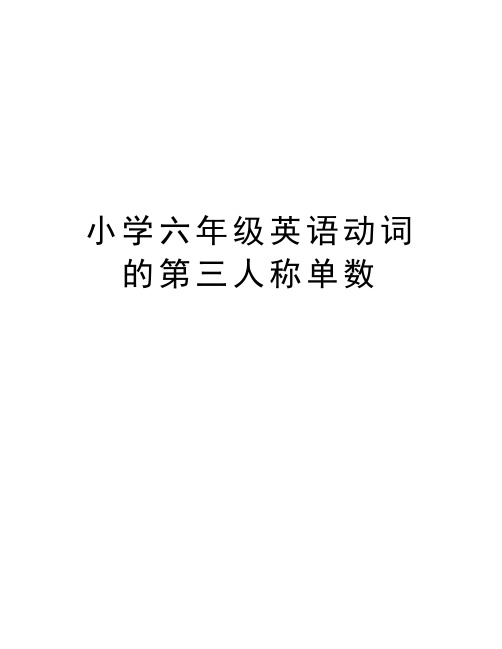
小学六年级英语动词的第三人称单数小学英语语法:“第三人称单数”第三人称有“他、她、它以及一些单数名词”。
当主语是第三人称单数时,谓语动词要用第三人称单数形式,即常在动词原形后加-s或-es。
一、动词第三人称单数的变化规则及发音规律动词原形变第三人称单数的规则与发音规律同名词单数变复数大致相同,请认真观察。
1、大多数动词在词尾加“S”如:stop-stops [s] ; make-makes [s] read-reads [z] ; play-plays [z]2、以辅音字母加“y”结尾的,要先将“y”变为“i”,然后在加“es”读[iz] 如:fly-flies [z]; carry-carries [z] study-studies [z]; worry-worries3、以“s, x, ch, sh”结尾的,在词尾加“es”,发音为[iz] 如:teach-teaches [iz]; watch-watches [iz]4、以“o”结尾的动词,加“es”,如:go-goes [z] do-does [z]注:下面几个动词变为单数时,原词的元音部分的发音发生了较大的变化,请注意记忆。
如:do [du:]-does [dz] say [sei]-says [sez]以不发音字母“e”结尾的开音节词,如果尾音是[s],[z]时,加“s”后字母“e”发音,与所加“s”一起读做[iz]。
如:close-closes [iz]一、第三人称代词 he, she, it 做主语时。
例如:She is very good at English. 她英语学得好。
He studies in a middle school. 他在一所中学学习。
He likes watching TV. 他喜欢看电视。
She has lunch at twelve. 她十二点吃午餐。
He can play football. 他会踢足球。
小学英语动词的单三形式讲解

小学英语动词的单三形式讲解
在英语中,动词的单数第三人称形式通常是在动词原型的末尾加上
“-s”或“-es”。
下面是一些常见的规则和例子:
1.一般规则:大多数动词只需要在动词原型后面加上“-s”。
例如:
- play(玩)→ plays
- run(跑)→ runs
- eat(吃)→ eats
2. 以s,sh,ch,x或o结尾的动词:在动词原型后面加上“-es”。
例如:
- pass(通过)→ passes
- wash(洗)→ washes
- watch(观看)→ watches
3. 以辅音字母+y结尾的动词:将“y”变为“i”,再加上“-es”。
例如:
- study(学习)→ studies
- fly(飞)→ flies
- try(尝试)→ tries
4. 以“o”结尾的动词:通常直接加上“-es”。
例如:
- go(去)→ goes
- do(做)→ does
需要注意的是,也存在一些不规则的动词,其单数第三人称形式需要记住或查阅相关词典。
小学 英语动词第三人称单数讲解课件

• 一、人称代词he, she, it是第三人称单数。
如:
• He likes watching TV. 他喜欢看电视。 She has lunch at twelve. 她十二点吃午餐。 It looks like a cat. 它看起来像只猫。
• 二、单个人名、地名或称呼作主语;是第 三人称单数。如:
• 五、不可数名词作主语时为第三人称单数。 如: ①The milk is in the glass. 牛奶在玻璃杯 里。 ②The bread is very small. 那面包很小。
• 六、当数字或字母作主语时,看作第三人 称单数。如: ①"6" is a lucky number. "6"是个吉利数 字。 ②"I" is a letter. "I"是个字母。
• 4. [Do/Does]______ Tina go swimming on Sunday?
• 5. [Do/Does]______they play football? Yes, they ___[do/does].
• 6. [Do/Does]______ we have a good teacher? Yes, we ____[do/does].
book.
• 9.Our teachers ___h__a_v_e__ a basketball. • 10.Their parents ___h_a_v_e____ some
story books. • 11.Nancy ___h_a_s__ many skirts. • 12.David ___h_a_s___ some jackets. • 13.My friends __h_a_v_e___ a football. • 14.What do you __h__a_v_e__ ? • 15.What does Mike __h_a_v_e___ ? • 16.What do your friends ___h_a_v_e___ ? • 17.What does Helen __h_a_v_e____ ?
小学英语第三人称单数

2021/10/10
He likes music. (变成否定形式) He doesn’t like music.
Grandma gives Daming a present. Grandma doesn’t give Daming a present.
7
对比变化
Hale Waihona Puke I like apples. I don’t like apples.. Do you like apples?
sound → sounds drop →drops say → says like →likes
2021/10/10
2
2.以s, sh, ch, x, o 结尾的动词,在词尾+ es
watch → watches
teach →teaches
guess →guesses
wash → washes
fix → fixes
在一般现在时中,当主语是人称单 数时,谓语动词要用人称单数形式, 即常在动词原形后加-s或-es。
GrandmagivesDamingapresent.
Samhaslunch.
2021/10/10
1
1.一般情况下,直接在动词后+s ,
collect →collects come →comes play →plays think →thinks
当主语为第一二人称时,怎样变成疑问句?
句子前加 上do
I like football。 Do you like football?
2021/10/10
He plays football. Does he play football?
句子前加does后 6 还有什么变化
动词第三人称单数变化规则如下
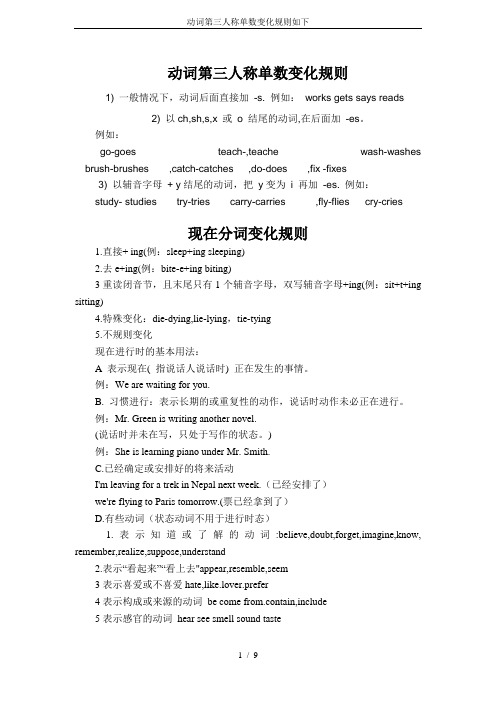
动词第三人称单数变化规则1) 一般情况下,动词后面直接加-s. 例如:works gets says reads2) 以ch,sh,s,x 或o 结尾的动词,在后面加-es。
例如:go-goes teach-,teache wash-washes brush-brushes ,catch-catches ,do-does ,fix -fixes3) 以辅音字母+ y结尾的动词,把y变为i 再加-es. 例如:study- studies try-tries carry-carries ,fly-flies cry-cries现在分词变化规则1.直接+ ing(例:sleep+ing sleeping)2.去e+ing(例:bite-e+ing biting)3重读闭音节,且末尾只有1个辅音字母,双写辅音字母+ing(例:sit+t+ing sitting)4.特殊变化:die-dying,lie-lying,tie-tying5.不规则变化现在进行时的基本用法:A 表示现在( 指说话人说话时) 正在发生的事情。
例:We are waiting for you.B. 习惯进行:表示长期的或重复性的动作,说话时动作未必正在进行。
例:Mr. Green is writing another novel.(说话时并未在写,只处于写作的状态。
)例:She is learning piano under Mr. Smith.C.已经确定或安排好的将来活动I'm leaving for a trek in Nepal next week.(已经安排了)we're flying to Paris tomorrow.(票已经拿到了)D.有些动词(状态动词不用于进行时态)1.表示知道或了解的动词:believe,doubt,forget,imagine,know, remember,realize,suppose,understand2.表示“看起来”“看上去"appear,resemble,seem3表示喜爱或不喜爱hate,like.lover.prefer4表示构成或来源的动词be come from.contain,include5表示感官的动词hear see smell sound taste6表示拥有的动词belong to.need.own .possess.want wish1、现在进行时的构成现在进行时由"be+v-ing"构成。
(完整版)英语动词的三单形式讲解
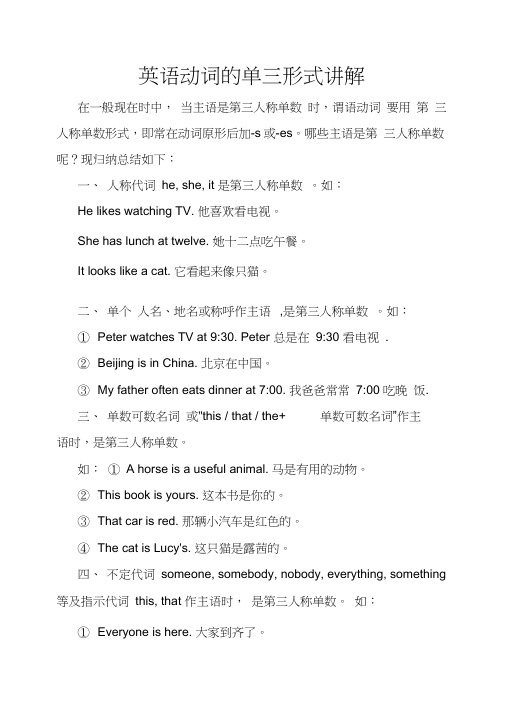
英语动词的单三形式讲解在一般现在时中,当主语是第三人称单数时,谓语动词要用第三人称单数形式,即常在动词原形后加-s或-es。
哪些主语是第三人称单数呢?现归纳总结如下:一、人称代词he, she, it 是第三人称单数。
如:He likes watching TV. 他喜欢看电视。
She has lunch at twelve. 她十二点吃午餐。
It looks like a cat. 它看起来像只猫。
二、单个人名、地名或称呼作主语,是第三人称单数。
如:①Peter watches TV at 9:30. Peter 总是在9:30 看电视.②Beijing is in China. 北京在中国。
③My father often eats dinner at 7:00. 我爸爸常常7:00 吃晚饭.三、单数可数名词或"this / that / the+ 单数可数名词”作主语时,是第三人称单数。
如:① A horse is a useful animal. 马是有用的动物。
②This book is yours. 这本书是你的。
③That car is red. 那辆小汽车是红色的。
④The cat is Lucy's. 这只猫是露茜的。
四、不定代词someone, somebody, nobody, everything, something 等及指示代词this, that 作主语时,是第三人称单数。
如:①Everyone is here. 大家到齐了。
②There is something wrong with the watch. 这块手表有毛病。
③This is a pen. 这是一支钢笔。
④That is an eraser. 那是一块橡皮擦。
五、不可数名词作主语时为第三人称单数。
如:① The milk is in the glass. 牛奶在玻璃杯里。
② The bread is very small. 那面包很小。
(知识点)理解动词的第三人称单数形式的变化规则

(知识点)理解动词的第三人称单数形式的变化规则在英语的动词变化中,第三人称单数形式是一个重要的知识点。
正确掌握动词的第三人称单数形式的变化规则,将有助于我们准确地使用英语语法。
本文将详细介绍动词第三人称单数形式的变化规则,并给出一些例子来帮助读者更好地理解。
一、动词第三人称单数形式变化规则在大多数情况下,动词的第三人称单数形式直接在原词的基础上加上“-s”或“-es”。
具体的规则如下:1. 对于以辅音字母加“y”结尾的动词,将“y”变为“i”,再加上“-es”;例如:- study(学习)→ he studies(他学习)- fly(飞)→ she flies(她飞)2. 对于以“o”结尾的动词,加上“-es”;例如:- go(去)→ he goes(他去)- do(做)→ she does(她做)3. 对于以“s”、“x”、“ch”、“sh”等音结尾的动词,直接在词尾加上“-es”;例如:- watch(观看)→ he watches(他观看)- kiss(亲吻)→ she kisses(她亲吻)4. 对于大多数动词,直接在词尾加上“-s”;例如:- work(工作)→ he works(他工作)- play(玩耍)→ she plays(她玩耍)需要注意的是,还有一些特殊的动词需要特殊处理。
比如,有一些动词的第三人称单数形式并不在词尾加“-s”或“-es”,而是通过其他方式变化。
例如:1. be(是)→ is(是)例如:- I am(我是)→ he is(他是)2. have(有)→ has(有)例如:- I have(我有)→ she h as(她有)3. do(做)→ does(做)例如:- I do(我做)→ he does(他做)二、动词第三人称单数形式变化的例子为了更好地理解动词第三人称单数形式的变化规则,以下是一些例子:1. work(工作)- I work(我工作)- he works(他工作)2. study(学习)- she studies(她学习)- they study(他们学习)3. play(玩耍)- he plays(他玩耍)- she plays(她玩耍)4. go(去)- I go(我去)- he goes(他去)5. watch(观看)- she watches(她观看)- they watch(他们观看)通过以上例子,我们可以清楚地看到动词的第三人称单数形式是如何变化的。
动词第三人称单数变化规则及用法
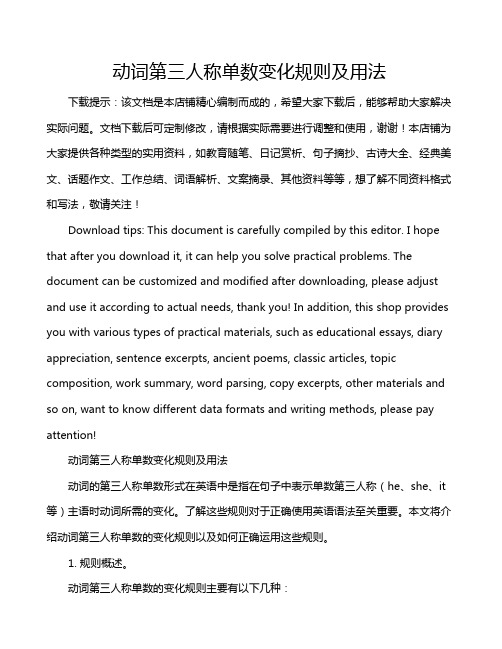
动词第三人称单数变化规则及用法下载提示:该文档是本店铺精心编制而成的,希望大家下载后,能够帮助大家解决实际问题。
文档下载后可定制修改,请根据实际需要进行调整和使用,谢谢!本店铺为大家提供各种类型的实用资料,如教育随笔、日记赏析、句子摘抄、古诗大全、经典美文、话题作文、工作总结、词语解析、文案摘录、其他资料等等,想了解不同资料格式和写法,敬请关注!Download tips: This document is carefully compiled by this editor. I hope that after you download it, it can help you solve practical problems. The document can be customized and modified after downloading, please adjust and use it according to actual needs, thank you! In addition, this shop provides you with various types of practical materials, such as educational essays, diary appreciation, sentence excerpts, ancient poems, classic articles, topic composition, work summary, word parsing, copy excerpts, other materials and so on, want to know different data formats and writing methods, please pay attention!动词第三人称单数变化规则及用法动词的第三人称单数形式在英语中是指在句子中表示单数第三人称(he、she、it 等)主语时动词所需的变化。
英语三单形式

英语第三人称单数形式的用法和规则英语第三人称单数形式是指用来表示单数的第三人称主语(he, she, it)的动词、代词、形容词和名词的变化形式。
英语第三人称单数形式的用法和规则是英语语法中的一个重要内容,也是英语学习者经常遇到的一个难点。
本文将从以下几个方面介绍英语第三人称单数形式的用法和规则:一、动词的第三人称单数形式动词的第三人称单数形式是指在现在时态中,当主语是单数的第三人称时,动词要在原形后加上-s或-es的变化形式。
例如:He likes apples. 他喜欢苹果。
She studies hard. 她学习努力。
It rains a lot in London. 伦敦经常下雨。
动词的第三人称单数形式的构成规则如下:1. 一般情况下,在动词原形后加-s。
例如:He works in a bank. 他在银行工作。
She plays the piano. 她弹钢琴。
It snows in winter. 冬天下雪。
2. 以s, x, ch, sh结尾的动词,在原形后加-es。
例如:He passes the exam. 他通过了考试。
She fixes the car. 她修好了车。
It watches TV. 它看电视。
3. 以辅音字母+y结尾的动词,把y改为i,再加-es。
例如:He studies English. 他学习英语。
She cries a lot. 她经常哭。
It flies in the sky. 它在天空飞。
4. 不规则变化的动词,要记住其第三人称单数形式。
例如:He has a book. 他有一本书。
(have - has)She does her homework. 她做她的作业。
(do - does)It goes to school. 它去上学。
(go - goes)二、代词的第三人称单数形式代词的第三人称单数形式是指用来替代单数的第三人称主语或宾语的代词。
第三人称单数be动词
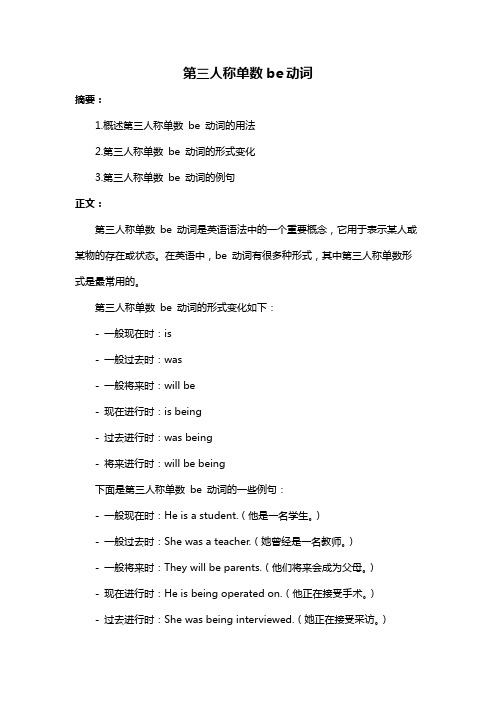
第三人称单数be动词
摘要:
1.概述第三人称单数be 动词的用法
2.第三人称单数be 动词的形式变化
3.第三人称单数be 动词的例句
正文:
第三人称单数be 动词是英语语法中的一个重要概念,它用于表示某人或某物的存在或状态。
在英语中,be 动词有很多种形式,其中第三人称单数形式是最常用的。
第三人称单数be 动词的形式变化如下:
- 一般现在时:is
- 一般过去时:was
- 一般将来时:will be
- 现在进行时:is being
- 过去进行时:was being
- 将来进行时:will be being
下面是第三人称单数be 动词的一些例句:
- 一般现在时:He is a student.(他是一名学生。
)
- 一般过去时:She was a teacher.(她曾经是一名教师。
)
- 一般将来时:They will be parents.(他们将来会成为父母。
)
- 现在进行时:He is being operated on.(他正在接受手术。
)
- 过去进行时:She was being interviewed.(她正在接受采访。
)
- 将来进行时:We will be traveling in Europe.(我们将要去欧洲旅行。
)
总之,第三人称单数be 动词在英语中扮演着至关重要的角色,它是构建句子的基础。
英语三单形式变化规则
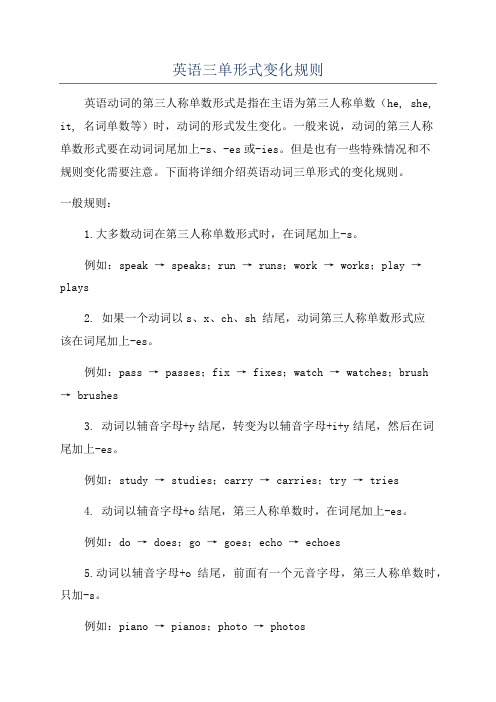
英语三单形式变化规则英语动词的第三人称单数形式是指在主语为第三人称单数(he, she, it, 名词单数等)时,动词的形式发生变化。
一般来说,动词的第三人称单数形式要在动词词尾加上-s、-es或-ies。
但是也有一些特殊情况和不规则变化需要注意。
下面将详细介绍英语动词三单形式的变化规则。
一般规则:1.大多数动词在第三人称单数形式时,在词尾加上-s。
例如:speak → speaks;run → runs;work → works;play → plays2. 如果一个动词以s、x、ch、sh 结尾,动词第三人称单数形式应该在词尾加上-es。
例如:pass → passes;fix → fixes;watch → watches;brush→ brushes3. 动词以辅音字母+y结尾,转变为以辅音字母+i+y结尾,然后在词尾加上-es。
例如:study → studies;carry → carries;try → tries4. 动词以辅音字母+o结尾,第三人称单数时,在词尾加上-es。
例如:do → does;go → goes;echo → echoes5.动词以辅音字母+o结尾,前面有一个元音字母,第三人称单数时,只加-s。
例如:piano → pianos;photo → photos6. 动词以辅音字母+consonant字母+ y 结尾,将y改为ies。
例如:study → studies;fly → flies;cry → cries7.动词以“辅音字母+_y”的形式结尾,但是该辅音字母前是一个元音字母。
这种情况下,动词的第三人称单数形式在词尾加上-s。
例如:play → plays;pray → prays;enjoy → enjoys不规则变化:除了一般的规则以外,还有一些常见的动词变化形式是不规则的,需要单独记忆。
1. be → is(am,are)例如:She is a student. → He is a teacher.注意:be动词变化形式较为特殊,主语为第三人称单数时,is是be 动词的正确形式。
单词第三人称单数形式变化规则
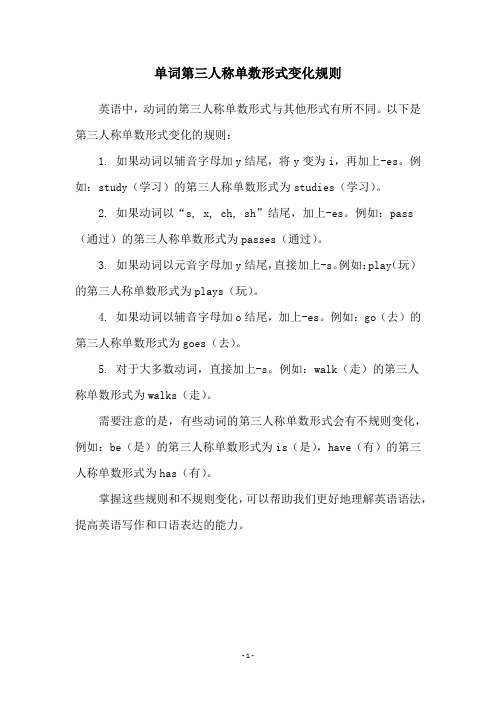
单词第三人称单数形式变化规则
英语中,动词的第三人称单数形式与其他形式有所不同。
以下是第三人称单数形式变化的规则:
1. 如果动词以辅音字母加y结尾,将y变为i,再加上-es。
例如:study(学习)的第三人称单数形式为studies(学习)。
2. 如果动词以“s, x, ch, sh”结尾,加上-es。
例如:pass (通过)的第三人称单数形式为passes(通过)。
3. 如果动词以元音字母加y结尾,直接加上-s。
例如:play(玩)的第三人称单数形式为plays(玩)。
4. 如果动词以辅音字母加o结尾,加上-es。
例如:go(去)的第三人称单数形式为goes(去)。
5. 对于大多数动词,直接加上-s。
例如:walk(走)的第三人
称单数形式为walks(走)。
需要注意的是,有些动词的第三人称单数形式会有不规则变化,例如:be(是)的第三人称单数形式为is(是),have(有)的第三人称单数形式为has(有)。
掌握这些规则和不规则变化,可以帮助我们更好地理解英语语法,提高英语写作和口语表达的能力。
- 1 -。
英语的单三形式归纳总结

英语的单三形式归纳总结英语动词的单三形式是指动词在第三人称单数主语下的变化形式。
在英语语法中,这是一项重要的规则,需要掌握和熟练运用。
本文将对英语的单三形式进行归纳总结,并提供一些常见动词的变化规律。
一、动词变化规律大多数英语动词在单三形式下需要在词尾加上第三人称单数代词“-s”或“-es”。
具体的变化规律如下:1. 一般情况下,在动词词尾直接加上“-s”。
例如:- walk → walks- talk → talks- play → plays2. 当动词以辅音字母+y结尾时,将“y”变为“i”,再加上“-es”。
例如:- carry → carries- study → studies- fly → flies3. 当动词以“s”、“x”、“sh”、“ch”结尾时,加上“-es”。
例如:- kiss → kisses- fix → fixes- wash → washes- watch → watches4. 当动词以“o”结尾时,有以下两种情况:- 如果动词的前一音节是元音字母,直接加上“-s”。
- 如果动词的前一音节是辅音字母,则加上“-es”。
例如:- go → goes- do → does- go → goes- potato → potatoes5. 动词“have”的单三形式是“has”。
二、不规则变化动词除了以上规律的动词形式变化外,还有一些特殊的不规则变化动词需要注意。
这些动词的变化形式并不遵循通常的规律,需要进行熟记和练习。
以下是一些常见的不规则动词变化形式:1. be → is2. have → has3. do → does4. go → goes5. say → says6. get → gets7. make → makes8. see → sees9. take → takes10. come → comes11. give → gives12. find → finds13. think → thinks14. know → knows15. want → wants三、总结与补充通过对英语的单三形式的归纳总结,我们可以看到大多数动词在单三形式下需要在词尾加上“-s”或“-es”。
小学英语语法——动词的单数三人称
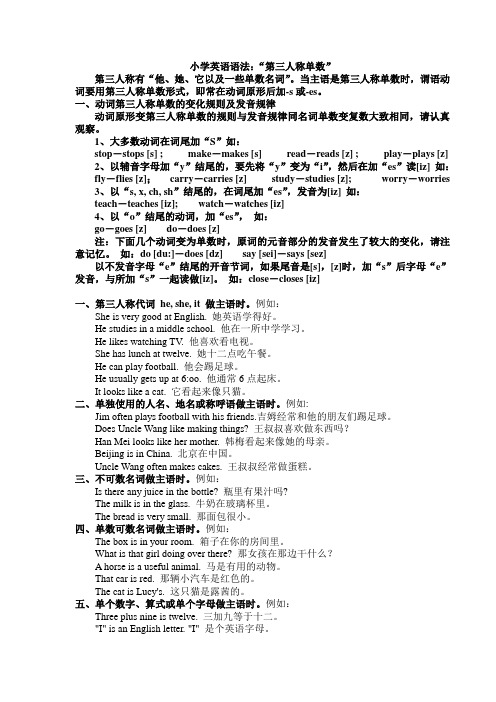
小学英语语法:“第三人称单数”第三人称有“他、她、它以及一些单数名词”。
当主语是第三人称单数时,谓语动词要用第三人称单数形式,即常在动词原形后加-s或-es。
一、动词第三人称单数的变化规则及发音规律动词原形变第三人称单数的规则与发音规律同名词单数变复数大致相同,请认真观察。
1、大多数动词在词尾加“S”如:stop-stops [s] ; make-makes [s] read-reads [z] ; play-plays [z]2、以辅音字母加“y”结尾的,要先将“y”变为“i”,然后在加“es”读[iz] 如:fly-flies [z];carry-carries [z] study-studies [z]; worry-worries3、以“s, x, ch, sh”结尾的,在词尾加“es”,发音为[iz] 如:teach-teaches [iz]; watch-watches [iz]4、以“o”结尾的动词,加“es”,如:go-goes [z] do-does [z]注:下面几个动词变为单数时,原词的元音部分的发音发生了较大的变化,请注意记忆。
如:do [du:]-does [dz] say [sei]-says [sez]以不发音字母“e”结尾的开音节词,如果尾音是[s],[z]时,加“s”后字母“e”发音,与所加“s”一起读做[iz]。
如:close-closes [iz]一、第三人称代词he, she, it 做主语时。
例如:She is very good at English. 她英语学得好。
He studies in a middle school. 他在一所中学学习。
He likes watching TV. 他喜欢看电视。
She has lunch at twelve. 她十二点吃午餐。
He can play football. 他会踢足球。
He usually gets up at 6:oo. 他通常6点起床。
小学动词第三人称单数形式用法+练习

小学动词第三人称单数形式用法+练习一般现在时中的第三人称单数形式一般现在时用于表示事物或人物的特征、状态、经常性或惯性的动作,以及客观现实。
当主语为第三人称单数时,谓语动词应使用第三人称单数形式,即在动词原形后加-s或-es。
一般现在时的基本用法一般现在时有以下基本用法:1.表示事物或人物的特征、状态,如“天空是蓝色的”;2.表示经常性或惯性的动作,如“我每天六点起床”;3.表示客观现实,如“地球绕着太阳转”。
标志词(时间状语)包括always。
every week (day。
year。
month…)。
once a week。
every…。
sometimes。
at…。
on Sunday。
usually。
often。
never。
hardly等。
哪些主语是第三人称单数?以下主语是第三人称单数:1.人称代词he。
she。
it,如“他喜欢看电视”;2.单个人名、地名或称呼作主语,如“XXX看起来像她的母亲”;3.单数可数名词或“this / that / the+单数可数名词”作主语时,如“马是有用的动物”;4.不定代词someone。
somebody。
nobody。
everything。
something等及指示代词this。
that作主语时,如“大家到齐了”。
1.This is a pen。
(改写) This object is a XXX.2.That is an eraser。
(改写) The object over there is a rubber eraser.3.The milk is in the glass。
(改写) The glass contains milk.4.The bread is very small。
(改写) The size of the bread isvery small.5."6" is a lucky number。
(改写) The number "6" is XXX.6."I" XXX(改写) The character "I" is a letter.7.大多数动词在词尾加“S”。
动词《第三人称单数形式》的变化规则

小学英语动词第三人称单数变化规则一般现在时的肯定句中,主语为第三人称单数的动词变化主要体现在词尾的变化上,其规律为:1、变否定句:格式为doesn’t/does not + 动词原形,如:He goes to school at six in the morning. (变否定句)→He doesn't go to school at six in the morning.2、变一般疑问句:要借用助动词does,如:She goes home at five every day.→Does she go home at five every day?--- Yes, she does./No, she doesn’t.哪些主语是第三人称单数?除I、you之外的所有可数名词单数及不可数名词。
(he she it 个人名)例题引路:判断下列词语哪些是第三人称单数,是请打“√”不是请打“×”。
he ( ) we( ) she( ) they( )it ( ) Han Mei ( ) uncle Wang ( )the farmers( ) my mother( ) Linda( )Sally and Lucy( ) the dog( ) the cats( )1、写出下列动词的第三人称单数。
drink ________ go _______ stay ________ make ________ look _________ have_______ pass_______ carry _______ come________ watch________ plant_______ fly ________ study_______ brush________ teach________ 2、用括号内动词的适当形式填空。
1. He often ________(have) dinner at home.2. We _____________ (not watch) TV on Monday.3. Nick ___________ (not go) to the zoo on Sunday.4. ________ they __________ (like) the World Cup?5. What _________they often _________ (do) on Saturdays?6. _________ your parents _________ (read) newspapers every day?7. There ________(be) some water in the bottle.8. My aunt _______(look) after her baby carefully.9. The child often _______(watch) TV in the evening.10. Mike’s sister ________ (cook) nice food. I _______ (like) eating it very much. 21. _______ (do) your brother_______ (watch) TV in the evening? No, he_______ (not).3、选出正确的答案:1. She (like / likes) to play football.2. He (like / likes) drinking milk.3. I (like / likes) to watch TV.4. We (like / likes) to play badminton.5. They (like / likes) to sing songs.6. She (read / reads) books every day.7. He (play / plays) computer games every day.8. It (listen / listens) to the radio every day.9. Linda (draw / draws) pictures every day.10. Jane and Linda (play / plays) football every day.5、把下列句子变为否定句:1. We like playing football.2. Linda swims every day.3. They like playing games.4. My father reads newspaper in the evening.7、把下列句子变为疑问句,并做肯定和否定回答。
- 1、下载文档前请自行甄别文档内容的完整性,平台不提供额外的编辑、内容补充、找答案等附加服务。
- 2、"仅部分预览"的文档,不可在线预览部分如存在完整性等问题,可反馈申请退款(可完整预览的文档不适用该条件!)。
- 3、如文档侵犯您的权益,请联系客服反馈,我们会尽快为您处理(人工客服工作时间:9:00-18:30)。
般现在时中的第三人称单数形式在一般现在时中,当主语是第三人称单数时,谓语动词要用第三人称单数形式,形后加-s或-es。
(一)什么是一般现在时?一般现在时的基本用法有哪些呢?【一般现在时的功能】1. 表示事物或人物的特征、状态。
如:The sky is blue.天空是蓝色的。
2. 表示经常性或习惯性的动作。
如:I get up at six every day.我每天六点起床。
标志词(时间状语):always, every week (day, year, month …),once a week, every …,sometimes, at …,on Sun day uausllyoften,never,hardly.........3. 表示客观现实。
如:The earth goes around the sun.地球绕着太阳转。
(二)哪些主语是第三人称单数?现归纳总结如下:、单个人名、地名或称呼作主语;是第三人称单数。
如:①Han Mei looks like her mother. 韩梅看起来像她的母亲。
②Beiji ng is in Chi na. 北京在中国。
即常在动词原人称代词he, she, itHe likes watch ing TV. he has lunch at twelve. It looks like a cat. 是第三人称单数。
如:他喜欢看电视。
她十二点吃午餐。
它看起来像只猫。
③Uncle Wang ofte n makes cakes. 王叔叔经常做蛋糕。
① A horse is a useful animal.四、不定代词 someone, somebody, nobody, everything, something that 作主语时,是第三人称单数。
如:① Everyone is here. 大家到齐了。
② There is something wrong with the watch.③ This is a pen. 这是一支钢笔。
除上述规律外,还应注意下面三点:1. 动词 have ,遇到主语是第三人称单数时,要用 has ; 动词 be is 。
2. 含有动词第三人称单数形式的句子变否定句时,要用 doesn't + to school at six in themorning.(变否定句)He does n't go to school 3. 对含有动词第三人称单数形式的句子提问时,要用助动词 does ,如:She goes home at five三、单数可数名词或 "this / that / the+单数可数名词 " 作主语时,是第三人称单数。
如:② This book is yours.这本书是你的。
③ That car is red.那辆小汽车是红色的。
④ The cat is Lucy's.这只猫是露茜的。
④ That is an eraser.那是一块橡皮擦。
五、不可数名词作主语时为第三人称单数。
如: ① The milk is in the glass. 牛奶在玻璃杯里。
② The bread is very small. 那面包很小。
六、当数字或字母作主语时,看作第三人称单数。
如: ①"6" is a lucky number. "6" 是个吉利数字。
② "I" is a letter. "I"是个字母。
马是有用的动物。
等及指示代词 this,这块手表有毛病。
的第三人称单数形式是 动词原形,如: He goes at six inthe morning.every day.(对划线部分提问)宀When / What time does she go home every day?(三)含有动词第三人称单数形式的句子变否定句和疑问时怎样变?【注意:】只要句子中出现do, does,don 't,doesn ' t, 句子中原来的实意动词要用原形例如:He likes即ples.(改成否定句)He doesn ' t likes apples 。
(错)He doesn't like apples 。
(对)A 否定句:(1)当主语是第一,二或复数时,主语+ don't + 动词原形(+其它)。
如:I don't like bread.(2)当主语为第三人称单数时,要用doesn't 构成否定句。
如:He doesn't often play.B 一般疑问句:(1)当主语是第一,二或复数时,Do +主语+动词原形+其它。
如:Do you often play football?- Yes, I do. / No, I don't.(2)当主语为第三人称单数时,要用does 构成一般疑问句。
如:- Does she go to work by bike?- Yes, she does. / No, she doesn't.C特殊疑问句:疑问词+—般疑问句。
如:How does your father go to work?(四)一般现在时 -- 动词第三人称单数形式构成规则(一般现在时中主语时第三人称1大多数动词在词尾加“ S”如:① stop —stops make —makes read —reads play —plays [z]2、以辅音字母加“ y”结尾的,要先将“ y”变为“ i ”,然后在加“ es”读[iz]女口:fly —flies carry —carries study —studies worry —worries3、以“ s, x, ch, sh ”结尾的,在词尾加“ es”,发音为如:teach —teaches watch —watchesgo-- make--4、 以“ o ”结尾的动词,加“ es ”,如:go - goes do - does 5、 以不发音字母“ e ”结尾的开音节词,加“ s ”女口: close — closes [iz] 6、特殊: ①.be 动词包括:am is , are 。
第三人称单数用is ;过去式为was ;复数用are ,过去式为囤.动词have ,遇到主语是第三人称单数时, 要用has ;动词be 的第三人称单数形式 were.is。
五)巩固练习题:、 写出下列动词的第三人称单数形式:sit- die--guess- go--rush- touch--reach- brush--fly-say--copy-run--do-live--enjoy--wish--Tie-buy-- fix-cry-have-play--teach--study--drink-stay--look-- carry--come-- watch--plant-- flydo--二、用括号内动词的适当形式填空。
1. He often _____ (have) dinner at home.2. Daniel and Tommy _______ (be) in Class One.3. We ______ (not watch) TV on Monday.4. Nick ______ (not go) to the zoo on Sunday.5. ____ they ______ (like) the World Cup?6. What _____ they often ______ (do) on Saturdays?7. _____ your parents _____ (read) newspapers every day?8. The girl _____ (teach) us English on Sundays.9. She and I ______ (take) a walk together every evening.10. There ______ (be) some water in the bottle.11. Mike _____ (like) cooking.12. They _____ (have) the same hobby.13. My aunt ____ (look) after her baby carefully.14. You always _____ (do) your homework well.15. I _____ (be) ill. I ' m staying in bed.16. She _____ (go) to school from Monday to Friday.17. Liu Tao _____ (do) not like PE.18. The child often _____ (watch) TV in the evening.19. Su Hai and Su Yang ____ (have) eight lessons this term.20. -What day _____ (be) it today?-It ' s Saturday三、改错(划出错误的地方,将正确的写在横线上)1. Is your brother speak English? ________________2. Does he likes going fishing? ________________3. He likes play games after class. _______________4. Mr. Wu teachs us English. ________________5. She don ' t do her homework on Sundays. __________________练习题练习一、写出下列动词的第三人称单数drink ___ go ____ stay ___ make ___ look___have ___ pass ____ c arry ___ come ___ watch ____ p lant ____ fly ___ study __ brush___do __ teach ____ m eet _____ bring___练习二、将括号里动词的适当形式填入横线上。
1. I _______ in the corridors. (walk)2. He ________ in the corridors. (run)3. She _________ her face once a day. (wash)4. They __________ their teeth once a day. (brush)5. You _________ up your clothes once a day. (hang)6. We _________ our home work once a day. (finish)7. He __________ rubbish in the classroom. (throw)8. She ___________ rubbish on the floor. (throw)9. I ____________ rubbish in the bin. (throw)10. They _________ the table once a day. (set)11. Peter never ________ in the corridors. (run)12. Mary usually _______ the table. (set)13. Pat and Ken _______ the plants in the morning. (water)14. The boy _________ his hair once a day. (comb)15. Miss Cheng ________ TV at home. (watch)16. My sister ________ his schoolbag once a day. (pack)17. My mother _______ dinner for me. (cook)18. My parents _______ the house at Chinese New Year. (clean)19. My teachers _______ us some gifts. (give)20. My friends ________ the table with me. (set)练习三、选择正确的单词填到括号里。
